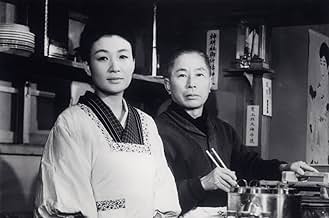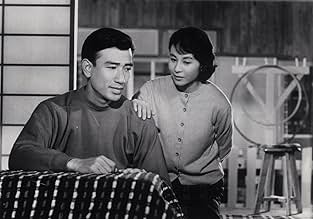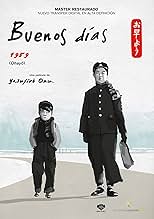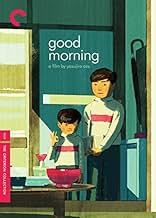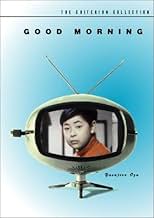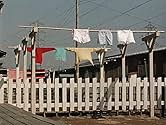NOTE IMDb
7,8/10
12 k
MA NOTE
Deux petits garçons commencent une grève du silence pour pousser leurs parents à leur acheter une télévision.Deux petits garçons commencent une grève du silence pour pousser leurs parents à leur acheter une télévision.Deux petits garçons commencent une grève du silence pour pousser leurs parents à leur acheter une télévision.
- Réalisation
- Scénario
- Casting principal
Avis à la une
While somewhat lighter than most of Ozu's features, this is still a rather perceptive film that is also entertaining to watch. The situation and the characters are all straightforward, yet Ozu's expert eye sees plenty of things worth considering, and each simple story development has a purpose. If the material remains generally lightweight when compared to some of his other movies, it still has the same thoughtful, low-key touch and genuinely human characters.
The young boys drive much of the story in this one, and they are very believable, whether in their petulant responses to parental authority or in their schoolboy fads. Some of the latter can be slightly off-putting at times, but then such things do rather ring true with the nature of boys at that stage of their lives.
The cast is quite large, so that none of the characters gets a lot more screen time than any of the others, yet somehow all of them not only come alive, but get some defining moments. Most of the adult characters are simple, yet easy to care about, and there are several good performances. The grandmother character and the aunt of the two brothers are probably the most interesting of the characters, yet all of them have a purpose.
As is usually the case with Ozu's movies, you can watch it a second time and see additional detail in the characters' relationships and dialogue. This time, the issues involved are not as significant as usual, yet the simple plot provides some insights into the ways that families and neighbors communicate with one another and understand one another. It's probably more entertaining than enlightening, but yet there is some substance as well.
The young boys drive much of the story in this one, and they are very believable, whether in their petulant responses to parental authority or in their schoolboy fads. Some of the latter can be slightly off-putting at times, but then such things do rather ring true with the nature of boys at that stage of their lives.
The cast is quite large, so that none of the characters gets a lot more screen time than any of the others, yet somehow all of them not only come alive, but get some defining moments. Most of the adult characters are simple, yet easy to care about, and there are several good performances. The grandmother character and the aunt of the two brothers are probably the most interesting of the characters, yet all of them have a purpose.
As is usually the case with Ozu's movies, you can watch it a second time and see additional detail in the characters' relationships and dialogue. This time, the issues involved are not as significant as usual, yet the simple plot provides some insights into the ways that families and neighbors communicate with one another and understand one another. It's probably more entertaining than enlightening, but yet there is some substance as well.
It may have the skimpiest of plots--two young brothers take a vow of silence until their parents buy them a television--but Yasujiro Ozu's 1959 picture is anything but slight, taking on the subject of language (ironic, considering the story) with attentiveness and intelligence. In his deliberate, contemplative manner, Ozu presents a wry commentary on the ways even the most innocuous words can harm (gossip) or become the building blocks of a relationship (a budding romance is confirmed by a conversation about the weather); he also notes Japan's growing fascination with the English language (the older boy studies it) and the increasing obsession, now with fourteen years of distance from the war, with American technology--the suburban landscape is peppered with aerial antennas as television begins to permeate the culture. It's subtly beautiful: each shot is perfectly framed (the camera never moves) with an excellent use of depth that highlights exactly what the director wants you to see and giving you plenty of space to focus; it's easy to see how a master of today's Asian cinema such as Wong Kar-Wai would be profoundly influenced by Ozu's languid yet carefully observed filmmaking. A delight; it's also a fine introduction for younger viewers to the magnificence of international cinema.
Ozu said he wanted to make a film about people's inability to express the important things, but natter on about unimportant gossip. This all comes out thanks to two boys that really want a TV. They enter into a vow of silence until their TV comes. This silence is misconstrued by the neighbours, who think their mother is angry at them. They begin to gossip amongst themselves and rumors soon start. Meanwhile, the young boys' aunt and teacher are attracted, but fail to act on their emotions. This is a lovely little film, filled with some great humor. Though, I must admit, there was a bit too much focus on the poo/farts jokes. The two boys, especially the youngest, are very cute and make their efforts to get a TV seem less brattish. It's really sweet to see how dedicated the parents are, and even though the kids are kind of mean, they do appreciate the gift in the end. There's no escaping Ozu's look at the clashes between old and new, with the TV looming over all procedures as something that will change life. A little gem, if not one of Ozu's classics.
"Good Morning," is one of my favorite's films.
It means a lot to me personally, because -like all of Ozu's work- it demonstrates a brilliant understanding of the complexities of being human. It contains simple wisdom, humour, and kindness; and sadly the whole of cinema history has provided us with very few films which can make such a claim. Ozu celebrates the beauty of middle-class existence, all the while delivering a profound criticism of our tendency to permit "small talk" to dominate conversations. Ultimately though, it is the humour which makes "Good Morning" my favorite's Ozu picture, for it is a very funny movie. Very funny and very satisfying! I can hardly imagine an open-minded person not enjoying it.
Because many North American viewers have a reluctance to watch films more than a few years old, or in languages other than English, Ozu's exposure here is still extremely limited. That is unfortunate because Ozu's films are quite universal.
I feel confident that anyone could appreciate Ozu's genius in this film.
It means a lot to me personally, because -like all of Ozu's work- it demonstrates a brilliant understanding of the complexities of being human. It contains simple wisdom, humour, and kindness; and sadly the whole of cinema history has provided us with very few films which can make such a claim. Ozu celebrates the beauty of middle-class existence, all the while delivering a profound criticism of our tendency to permit "small talk" to dominate conversations. Ultimately though, it is the humour which makes "Good Morning" my favorite's Ozu picture, for it is a very funny movie. Very funny and very satisfying! I can hardly imagine an open-minded person not enjoying it.
Because many North American viewers have a reluctance to watch films more than a few years old, or in languages other than English, Ozu's exposure here is still extremely limited. That is unfortunate because Ozu's films are quite universal.
I feel confident that anyone could appreciate Ozu's genius in this film.
Although I appreciate Ozu's film style & quality, I've never been a big fan due to the generally melodramatic themes of his movies.
OHAYO is quite different. The multiple comic themes range from fart jokes & clueless gossiping neighbors to fears of obsolescence in a rapidly changing society.
Particularly prescient is the early awareness of the Baka (idiot) power of television. In Japan it has been common for decades to have TV sets mounted in temples & shrines so that the Kami (spirits) can watch.
We in the U.S. have long been "a nation of 100 million idiots" (and then some) from our obsession with constant entertainment especially in the form of TV. Our children whine & act petulant unless they have their own TV & DVDs in their rooms & even when riding in the car. In many homes the TV is constantly on, regardless of what might be happening either on the boob-tube or outside (such as visitors calling).
Ozu saw it coming almost half a century ago.
OHAYO is quite different. The multiple comic themes range from fart jokes & clueless gossiping neighbors to fears of obsolescence in a rapidly changing society.
Particularly prescient is the early awareness of the Baka (idiot) power of television. In Japan it has been common for decades to have TV sets mounted in temples & shrines so that the Kami (spirits) can watch.
We in the U.S. have long been "a nation of 100 million idiots" (and then some) from our obsession with constant entertainment especially in the form of TV. Our children whine & act petulant unless they have their own TV & DVDs in their rooms & even when riding in the car. In many homes the TV is constantly on, regardless of what might be happening either on the boob-tube or outside (such as visitors calling).
Ozu saw it coming almost half a century ago.
Le saviez-vous
- AnecdotesYasujirô Ozu: [movie posters] Yasujirô Ozu pays tribute to his cinematic influences by putting all kinds of film posters all over the wall in his films. In this movie, there are two posters, one of La Chaîne (1958) (at 08:30) and one of Les amants (1958) (at 08:07), both at the neighbors' house.
- Versions alternativesThe original American theatrical release prints were in black and white.
- ConnexionsFeatured in Transcendental Style and Flatulence (2017)
Meilleurs choix
Connectez-vous pour évaluer et suivre la liste de favoris afin de recevoir des recommandations personnalisées
- How long is Good Morning?Alimenté par Alexa
Détails
Contribuer à cette page
Suggérer une modification ou ajouter du contenu manquant



